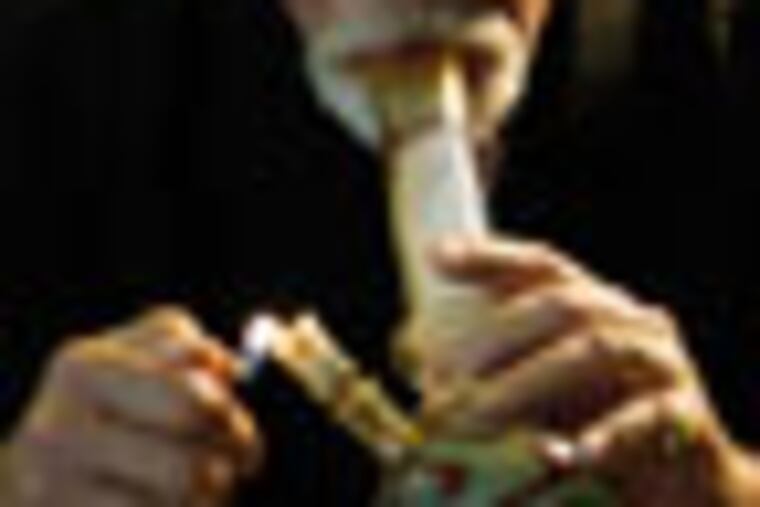N.J. legislators get busy removing medical-marijuana roadblocks
Bipartisan legislation designed to remove local roadblocks to the long-delayed launch of medical-marijuana businesses in New Jersey is gathering steam.

Bipartisan legislation designed to remove local roadblocks to the long-delayed launch of medical-marijuana businesses in New Jersey is gathering steam.
But Gov. Christie has hinted he may veto the measure.
Assemblyman Declan O'Scanlon (R., Monmouth) earlier this month introduced a bill designed to prevent local zoning and planning boards from rejecting pot farms and marijuana dispensaries based on residents' complaints.
The legislation would give the novel businesses protection under the state's Right to Farm Act. The law protects farmers from restrictions sought by newly sprouted neighborhoods.
O'Scanlon's bill would allow marijuana growers to operate on publicly preserved farmland and in agricultural zones without "county or municipal interference."
"We should do all we can to get this drug in the hands of all people who need it desperately," O'Scanlon said, explaining that only seriously ill people are eligible to buy the drug.
Assemblyman Reed Gusciora (D., Mercer) has signed on as a cosponsor.
Sen. Nicholas P. Scutari (D., Union) plans to introduce an identical bill in the upper house Monday.
"We are in our third year of the legislation on medical marijuana, and no dispensary has opened and no marijuana has been prescribed to anyone," Scutari said, sighing. He was one of the cosponsors of the legislation that legalized the sale of medicinal marijuana, which former Gov. Jon S. Corzine signed in January 2010.
So far, none of the six nonprofits approved to grow and sell marijuana has received all the approvals needed to move forward.
When Christie was sworn into office in 2010, he initially refused to authorize the businesses because the federal government still deems marijuana sales illegal.
Thirteen other states have legitimized the sales, relying upon the Justice Department's assurances that it would not "spend resources" prosecuting as long as the businesses followed state regulations and dispensed the drug only to sick people.
After reaching out to the Justice Department and reconsidering his position, Christie gave the medical marijuana program the green light over the summer.
Since then, boards and committees in Maple Shade, Westampton, Camden, and Upper Freehold have rejected proposed marijuana operations, mostly because residents objected, citing fears of increased crime.
The marijuana businesses promised 24-hour guards and video surveillance, but still could not get zoning approvals.
Asked about the O'Scanlon bill at a Jan. 12 news conference, Christie said local officials should call the shots.
"If they want a dispensary or a growing facility in their town, that's up to them. If they don't, then I will not as governor force them to take one. . . . I am not going to force this down the throats of municipalities," he said.
Christie went on to warn that the legislation was "not going to be received well at my desk."
Afterward, Michael Drewniak, the governor's spokesman, wrote in an e-mail: "We won't be saying how the Gov will handle that bill at this early stage. We have 45 days from passage in both houses to review it and make a decision to sign, veto, or conditionally veto."
O'Scanlon said he was not deterred by Christie's remarks.
"The governor has also shown repeatedly, as any administration . . . that they are perpetually open-minded," he said. "The goal is to help people get through their fear and reset the debate and get this necessary drug and efficacious drug into the hands of people that need it."
O'Scanlon said that he had no relatives or friends who would qualify for marijuana treatment, but that he felt compassion for people with cancer, Crohn's disease, seizures, AIDS/HIV, and other serious conditions that can be treated with the drug.
The dispensaries, he said, "will have more security than your CVS on the corner." His bill would require round-the-clock "manned security presence" or a security plan approved by a municipality.
Scutari said the bill also "takes away the argument" of towns that say they don't want to sanction a business not recognized as legal by the federal government. The legislation supersedes local ordinances that regulate marijuana operations.
Scutari predicted the companion bills would receive bipartisan support but said he was concerned about the legislation's fate upon reaching Christie.
The medical-marijuana program "is the law of the land," Scutari said, "but it is not moving along swiftly." He said he hoped the bills would help the dispensaries get up and running this year.